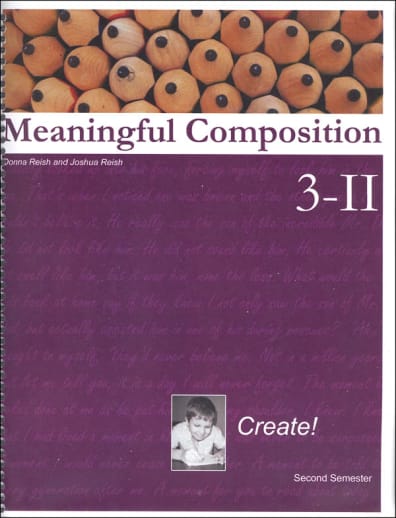Grades 2-3: Complete language arts (except spelling). Copywork, dictation, basic grammar, pre-writing skills, sentence and beginning paragraph construction, outlining, homophones, and synonyms/antonyms. Sixteen weeks each.
Meaningful Composition 3 (II): Create!
Description
Starting as a pull-out program from another series (Character Quality Language Arts), Meaningful Composition has emerged as a dynamic, full-featured writing program offering user-friendly structure; detailed, clear instruction in a logical and comfortable progression; minimal teacher prep/maximum student independence; and great flexibility. Offering a complete scope and sequence of writing instruction, the series progresses from grammar and sentence construction skills (early-middle elementary) to paragraph construction, creative writing, and essay construction skills (middle elementary through junior high) to strong academic essays, research reports and papers, and creative writing (high school).
Books correspond roughly to grade levels, and the two books per level (I and II) correspond roughly to semesters, most having 18 weeks of assignments (five per week). That said, there is a lot of flexibility built into the scope and sequence. Each book has activities for two levels - basic and extension. That means a single book might be used for multiple children in a family - or a co-op class. While there is a definite progression to the skills that are taught and practiced, students can enter at different levels and progress at different speeds. The I books (first semester books) are more general. These books cover and review a broad range of skills. One student might complete a I book in a semester while another might complete the same book in one year. The II books focus on a specific type of writing - creative, essay, research. This means that you could start with a I book from a particular level and then move to a II book from another level. Books 4-I, 6-I, and 8-I are grade level appropriate but would also provide strong remediation courses to use with a student whose writing skills are limited. All first semester books - 5 (I) through 9 (I) - have step-by-step lessons on how to create and write from a Sentence-by-Sentence Outline and how to complete the Checklist Challenge. Once a student completes any of these first semester MC books, he or she can easily move into a second-semester book of your choice. Odd-numbered book IIs (i.e. 3-II, 5-II, 7-II, and 9-II) provide a creative writing sequence. Even-numbered book IIs (i.e. 6-II, 8-II, etc.) provide an academic writing sequence - essays, reports, research.
Meaningful Composition utilizes the Directed Writing Approach. This means that the student is carefully and thoughtfully led through a sequenced development of writing skills, one manageable step at a time with the goal of growing an independent, competent communicator. In other words, there is no guesswork about what or how many (words, sentences, paragraphs, etc.) or how the student is to write. Instruction is written directly to the student, sometimes with questions to answer or exercises to work (the book is a consumable worktext) and sometimes through very specific writing assignments (compiled into a separate notebook). Answer keys (when appropriate) are provided in an appendix.
The courses provide a varying amount of grammar. Books 2-4, focusing on sentence construction skills, cover parts of speech and parts of sentences thoroughly. These books introduce Editor Duty (sentences to correct), Wacky Words (homophones and confusing words), and Checklist Challenge (how-to lessons on specific skills). Books in these levels should be completed in one semester. Other levels provide some grammar (usage-based) but could be combined with a more systematic grammar course.
There is virtually no advance prep, but the teacher does need to be an active participant in the learning process - especially in the early years (Books 2-4). Books 6-I and 8-I require the teacher to meet with the student weekly (one hour or so) to discuss the assignments, introduce outlining techniques, check the student's rough draft work, review the Checklist Challenges, and grade final compositions. Other levels also require teacher supervision with Checklist Challenges and grading. Students are expected to spend 45-60 minutes per day for 3-4 days each week working by themselves (at middle school and upper levels).
The course books are consumable (each student will need his own book), with the student completing many of the exercises directly into the worktext. However, compiling a notebook of composition assignments is also done. There is Christian content throughout the series with both instruction and writing assignments that take a biblical perspective toward character qualities. The appendices are helpful - editing and revising marks, answer keys, grammar cards, outline information, plagiarism info, and 14-week lesson plans for co-ops and small groups. All books are coil-bound with plastic covers. ~ Janice
| Product Format: | Paperback |
|---|---|
| Grade: | 3 |
| Brand: | Character Ink |
| Length in Inches: | 11 |
| Width in Inches: | 9.625 |
| Height in Inches: | 1.375 |
| Weight in Pounds: | 2.2 |

